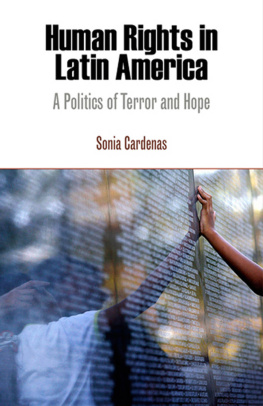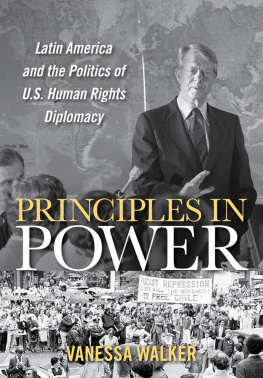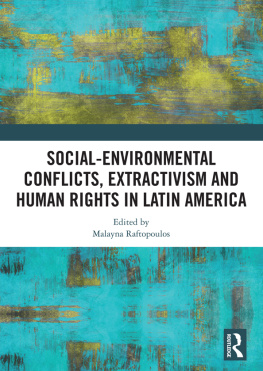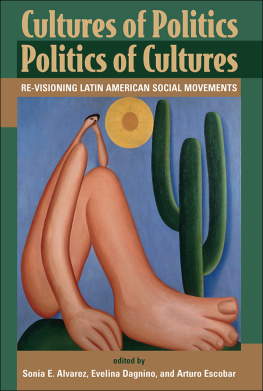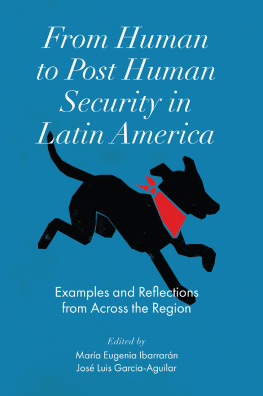Copyright 2010 University of Pennsylvania Press
All rights reserved. Except for brief quotations used for purposes of review or scholarly citation, none of this book may be reproduced in any form by any means without written permission from the publisher.
Published by
University of Pennsylvania Press
Philadelphia, Pennsylvania 19104-4112
Printed in the United States of America on acid-free paper
10 9 8 7 6 5 4 3 2 1
Library of Congress Cataloging-in-Publication Data
Cardenas, Sonia.
Human rights in Latin America: a politics of terror and hope / Sonia Cardenas.
p. cm. (Pennsylvania studies in human rights)
Includes bibliographical references and index.
ISBN 978-0-8122-4197-6 (alk. paper)
1. Human rightsLatin America. 2. Political persecutionLatin America.
3. Government accoutabilityLatin America. I. Title.
JC599.L3C368 2009
323.098dc22 2009008427
Preface
This project was entirely unforeseen. I had finished my first book, which included lengthy case studies of human rights in Chile and Argentina. That was a long and sinuous affair, with its origins in a dissertation begun over a decade earlier. With that behind me, I had no immediate plans to pursue another project on Latin America. It was nothing about the region per se. It was just that my research on human rights was much more global in scope.
Despite my broad interests, I regularly teach a course titled The Politics of Human Rights in Latin America. That too is an accident. Weeks after accepting a new position, I was in India conducting human rights research, when I received an urgent message from my soon-to-be department chair: they needed me to teach a human rights course on Latin America. Caught off guard, I raced against a flickering Internet connection and reluctantly agreed to teach the course.
Like the writing of this book, the course turned out to be immensely rewarding. I worked to capture the things that had originally moved and excited me about the subjecttroubled me into the late hours of the night. My technique in the classroom was to combine political science insights with images and stories of human rights in Latin America. Rather than lecture from afar, I sat with the students in a circle. The students, numbering about twenty, were noticeably responsive; and, I confess, the process energized me more than I might have imagined.
One challenge I had was in assigning readings, especially when I first taught the course in 2002. Regularly assembling a thick course reader, I wished someone would write a general text, one appealing to introductory human rights courses as well as regional surveys. Before long, I decided to write the book myself. Human Rights in Latin America follows my course outline, which served as a launching pad for the project, and draws on my own research as well as that of countless others. Fortunately, an increasing number of specialized books and films address many of the issues raised here, complementing the text; they are mentioned at the end of each chapter, and their creators have my gratitude for inspiring solidarity and setting high standards.
Tied so closely to my course, Human Rights in Latin America inevitably reflects my experiences with students. Their reactions, questions, and confusion have contributed fundamentally to this book. While there are too many students to thank individually, almost all of themthrough their engagement or skepticism or even boredom and hostilitychallenged me to sharpen my thinking and writing. Two additional students, Emily Costello and Danielle Harsip, served as my research assistants while I wrote the first draft of the book. Their enthusiasm was infectious, and I tried to keep them in mind as an important audience for the book as I struggled to set the right tone.
Most books depend on broader institutional support, and this one is no exception. The editorial team at the University of Pennsylvania Press were outstanding, and the book is better as a result of their intervention. I am especially indebted to my editor, Peter Agree, who encouraged me to pursue the project and is always a pleasure to work with. The anonymous reviewers made excellent suggestions, forcing me to be both comprehensive and accessible; and I am very grateful for their insights. Thanks are also due of course to Bert Lockwood, the series editor. While Getty Images and the United Nations permitted me to use their photographs, a generous grant from the Dean of Facultys office at Trinity College proved invaluable for completing the project on schedule and as I had envisioned it; I am very appreciative.
In my first book, I used the full names of the victims of abuse when possible. Too often, however, I treated them as mere numbers and tragic factors in my analysis, perhaps understandable for a social scientist trying to make sense of human rights. As their stories have remained with me, I tried to give them a fuller voice in this venue. That said, one of my goals in the book is to demonstrate that human rights can be studied systematically, as a complex set of issues, and from a perspective that takes narratives of suffering and courage seriously.
My own beacons of hopeAlexander and Samanthahave infused this book with a sense of urgency. Watching them grow rapidly in a world where terror abounds for so many, I wanted to record for them a message of hope (tinged with realism). This meant I had to work at record speed, sometimes watching an energetic toddler and a new infant out of the corner of my eye. My parents stepped in at crucial moments, for which I am thankful. As always, Andy kept me grounded, with his singular steadfastness and humor, encouraging me to pursue yet another project while reminding me of the few things in life that really matter.
Introduction: Terror and Hope
In October 1992, when I was 19 years old, I was kidnapped at the entrance to La Cantuta University.... When I was completely naked, they gave me an injection in the left arm. I felt dizzy but despite that, I could feel the terrible pain. They did the same thing the next day. I would have rather died than that.
They werent human beings.
Testimony of Magdalena Montesa to Perus Truth and Reconciliation Commission; pardoned in 1998 after spending six years in prison, falsely accused of terrorism
Fernando, my brother, used to discuss a lot with me. In the tough times, he did not want to leave.... Fernando felt happy there, with his political activity in his neighborhood and psychology and political theory studies. He spoke softly, unlike me.... My mother dedicated most of her life to looking for him. She still wears the white handkerchief with his name. In the intimate moments of life at home, a disappearance acquires its real meaning. There is an empty chair, with no clear explanation.
Marcelo Brodsky,
commenting on his brothers disappearance in Argentina in 1979
Survivors of torture and captivity often describe their experience as a seemingly impossible mix of terror and hope: agonizing fear and pain, combined with an ardent wish for a better day. Studying human rights issues also entails an uncomfortable blend of terror and hope: terror at witnessing the betrayal of other human beings, a restrained hope for greater justice. As observers, we can be simultaneously drawn to and repelled by human rights accounts. Stories of terror expose the darkest side of humanity while evoking empathy for the victims; given a different set of conditions, any one of us could fall prey to human rights abuse. Stories of hope inspire confidence in the ability of human beings to overcome horrific obstacles, even as we wonder whether we could muster similar courage in comparably terrifying circumstances.


